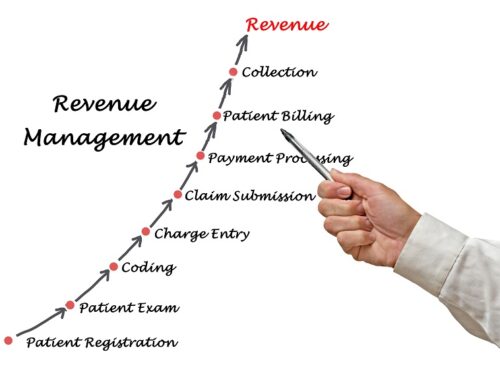In the complex world of healthcare, managing revenue cycles is a critical task. Business intelligence software can be a game-changer in this arena. Business analytics software can streamline processes, enhance decision-making, and boost financial outcomes. It does this by providing real-time data analysis, predictive analytics, and comprehensive reporting.
But how exactly does it work? And what should healthcare providers consider when choosing a business intelligence platform?
In this article, we will examine these questions and explore how business intelligence software can enhance revenue cycle management in the healthcare industry.
Understanding Healthcare Revenue Cycle Management
Healthcare revenue cycle management involves tracking patient care events from registration to final payment. It’s essential for maintaining financial health. Efficient management enables healthcare providers to minimize billing errors and reduce claim denials. This leads to improved cash flow and economic stability.
The process is intricate, involving several stages and multiple departments. Integrating these different areas smoothly is crucial for success.
The Role of Business Intelligence in Healthcare Finance
Business intelligence tools play a key role in healthcare finance. They help in analyzing large volumes of data for better insights.
Performance management software allows healthcare organizations to identify trends and patterns. This information is critical for strategic planning and operational improvement.
Key Roles of Business Intelligence in Healthcare:
- Enhancing data accuracy and reliability
- Reducing manual reporting time
- Identifying financial inefficiencies
By leveraging these tools, organizations can make data-driven decisions. This leads to a more efficient and transparent financial operation.
Key Features of Business Intelligence Software for Healthcare
Business intelligence software for healthcare comes with various features designed to enhance financial operations. These features are tailored to fit the unique needs of the healthcare industry.
Among the key features is data integration, which allows seamless connection with various healthcare systems. This enables a comprehensive view of the organization’s financial health.
Furthermore, these platforms offer advanced data visualization software. These tools convert complex financial data into easy-to-understand formats.
Essential Features of Business Intelligence Software:
- Robust data integration capabilities
- Advanced data visualization tools
- Real-time data analysis
- Customizable dashboards and reports
These features collectively contribute to improved financial performance in healthcare settings. They empower decision-makers with the insights needed for effective financial management.
Integration with Healthcare Systems
Integration is crucial for business intelligence software in the healthcare industry. It enables the software to communicate efficiently with existing systems, such as electronic health records.
This seamless integration ensures that all financial and patient data is in one place. It helps in reducing errors and redundancies. By consolidating this data, healthcare organizations can make more informed and timely decisions.
Moreover, integration simplifies the process of analyzing patient care costs and reimbursement rates. This allows for a comprehensive understanding of the financial aspects of patient care.
Data Visualization and Reporting
Data visualization is a pivotal feature of business intelligence tools. It translates complex datasets into visually engaging, easily digestible formats. This enables the rapid comprehension of large volumes of data.
Effective data visualization can highlight trends and outliers. This empowers healthcare professionals to identify issues and opportunities promptly.
Benefits of Data Visualization and Reporting:
- Facilitates quick data comprehension
- Enhances decision-making efficiency
- Identifies trends and patterns effortlessly
Moreover, these tools provide robust reporting capabilities. Customizable reports ensure that users can tailor the information to meet specific organizational needs. This adaptability is key to addressing diverse healthcare challenges.
Benefits of Implementing Business Intelligence in Healthcare
Implementing business intelligence software in healthcare offers numerous benefits. It supports improved financial management and enhances overall operational efficiency.
One major advantage is the ability to quickly identify inefficiencies. By analyzing large datasets, healthcare providers can make adjustments to reduce costs and improve services.
Moreover, these tools enable better compliance with healthcare regulations. They provide insights that help maintain standards and avoid penalties.
Key Benefits of Business Intelligence in Healthcare:
- Improved financial management
- Enhanced operational efficiency
- Compliance and regulatory support
- Timely identification of inefficiencies
- Cost reduction and service improvements
In summary, business intelligence enables healthcare providers to optimize their revenue cycle, thereby ensuring improved financial health. This ultimately leads to improved patient satisfaction and quality of care.
Enhancing Decision-Making with Real-Time Data
Real-time data analysis revolutionizes decision-making in healthcare. Having access to up-to-date information allows organizations to adapt to changes quickly.Healthcare providers can monitor key performance indicators continuously. This ongoing monitoring ensures decisions are based on the most current data available.
Additionally, real-time insights help in resource allocation. This ensures resources are used where they are needed most, optimizing efficiency and patient care.
Predictive Analytics for Revenue Forecasting
Predictive analytics is a powerful feature of business intelligence software. It enables healthcare organizations to forecast revenue more accurately. By analyzing historical data, predictive models can identify patterns and trends that help inform future decisions. These insights help anticipate future financial outcomes.
Moreover, predictive analytics can highlight potential financial issues before they arise. This proactive approach allows healthcare providers to implement corrective actions in advance.
Ultimately, using predictive analytics helps healthcare organizations to stabilize and enhance their financial operations. This foresight supports strategic planning and sustainable growth.
Selecting the Right Business Intelligence Software for Healthcare
Choosing the right business intelligence software is vital for healthcare organizations. The preferred solution should align with the organization’s specific needs and goals. Key features to consider include integration capabilities with existing systems, ease of use, and scalability.
Evaluating different software options carefully can make a big difference. Consider the software’s ability to provide comprehensive data analysis and real-time reporting. Look for platforms that offer robust security features to protect sensitive patient information.
Another aspect to consider is user support and training. Ensure that the vendor provides sufficient support and resources to enable employees to maximize the benefits of the software.
Factors to Consider:
- System integration capabilities
- Ease of use
- Scalability
- Security features
- User support and training
The right software can transform how healthcare organizations manage their financial operations, resulting in improved outcomes and increased efficiency.
Considerations for Implementation and Compliance
Implementing business intelligence software in healthcare requires careful planning and consideration. It’s crucial to address potential implementation challenges to ensure a smooth transition.
Compliance with healthcare regulations is another critical aspect. The software must meet all regulatory requirements to safeguard patient data and avoid legal issues.
Selecting a software solution that supports both implementation and compliance is crucial for achieving success. This approach not only protects the organization but also maximizes the benefits derived from using business intelligence tools.
Conclusion
Business intelligence software plays a transformative role in optimizing healthcare revenue cycle management. Providing real-time data insights and predictive analytics enhances decision-making and financial efficiency. If you’re looking to optimize your revenue cycle management and elevate your organization’s financial performance, consider exploring the range of business intelligence software offered by Credence Global Solutions. Contact us today for more information and take a proactive step towards enhancing your healthcare operations.





